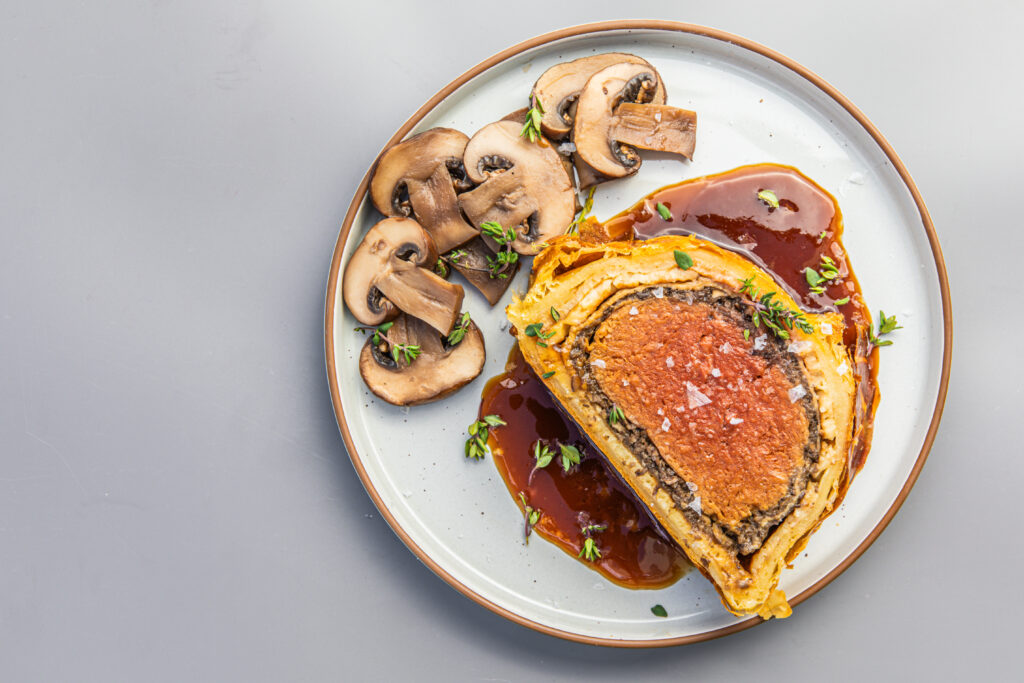4 Min. reading time
California-based The Better Meat Co has received $1.5 million from the U.S. Department of Defense to increase its production capacity with a new mycoprotein facility.
US food tech startup The Better Meat Co has received a $1.48 million grant from the US Department of Defense (DoD) to increase production of its mycoprotein ingredient for meat substitute products.
The funding was part of the government agency’s Distributed Bioindustrial Manufacturing Program (DBIMP), which aims to increase the U.S.’s fermentation capacity to strengthen its defense materials supply chain in five focus areas: food, fuel, fitness, firepower and manufacturing.
The Better Meat Co produces rhizal mycoprotein from Neurospora crassa, a strain of fungi used in traditional fermented foods and beverages such as the Brazilian liquor tiquira, the Indonesian staple oncom, and Roquefort cheese in the South of France.
The company plans to use the capital to expand its manufacturing capacity and open a new biomanufacturing facility for its shelf-stable, high-fiber, high-protein ingredient. The location of the factory has yet to be determined, according to the Defense Department.
“The United States will reap great benefits by taking a leadership role in organic production, especially when it comes to efficient, innovative methods of food production,” said Paul Shapiro, co-founder and CEO of The Better Meat Co.
A welcome development for The Better Meat Co


The investment comes weeks after The Better Meat Co.’s Rhiza ingredient received a “No Questions” letter from the Food and Drug Administration (FDA) granting its mycoprotein GRAS (Generally Recognized as Safe) status.
However, the product has been on the market for some time, as the company had already achieved self-certified GRAS status and was thus allowed to supply restaurants in Northern California with the protein ingredient for steaks, carne asada and foie gras analogues.
The traditional plant protein has been part of Perdue Farms’ Chicken Plus blended meat line since 2019, but meat analogues made from rhiza – derived from filamentous fungi – are being developed by companies such as Hormel Foods and Maple Leaf Foods. The company has signed several letters of intent and offtake agreements with major CPG brands in the US and Asia.
Based on its dry matter, Rhiza contains 30 g of fiber and about 45 g of protein per 100 g, with a protein digestibility value of 0.87–0.96 (similar to casein, beef and eggs). According to the GRAS advisory, the mycoprotein can be used to produce beef, pork, chicken and seafood analogues.
The company also recently switched to a continuous fermentation approach, which puts materials into bioreactors while the finished product is simultaneously harvested. This has allowed the company to increase yields and reduce production costs by 30% – even if no further R&D advances are made, the ingredient will now cost the same as conventional beef when mass-produced.
Speaking of which, The Better Meat Co currently uses a 9,000-liter fermenter and plans to use the Department of Defense grant to upgrade to a 150,000-liter vessel, Shapiro told FoodNavigator.
The government funding will be welcome for the startup, which has struggled to raise capital largely due to an 18-month legal battle with fellow mycelium meat startup Meati. With the battle now settled, The Better Meat Co is doubling down on its fundraising efforts with another round of investment in the coming months.
The US Department of Defense wants to advance the bioeconomy, but has dropped out of the cultured meat project


The DBIMP, which was launched earlier this year, has so far supported 13 startups with $23 million in grants, with up to $2.5 million aimed at strengthening U.S. biomanufacturing potential. Companies can apply for follow-on funding of up to $100 million, and the Department of Defense plans to invest in more than 30 projects in total.
In this round, The Better Meat Co joined six other startups that benefited from the nation’s capital: Battelle, Modular Genetics, Genomatica, Industrial Microbes, ZymoChem and Biosphere.
These investments are a response to a 2022 executive order from the Biden-Harris administration that focuses on advancing the country’s bioeconomy.
“President Biden called on the Department of Defense to explore how the agency can use biotechnology to make our supply chains more resilient, create jobs at home, and strengthen the American economy,” said Heidi Shyu, Under Secretary of Defense for Research and Development.
“These major investments will help fulfill its mission to harness the full potential and power of biotechnology to strengthen national and economic security,” she added.
The Department of Defense made major strides when it increased the budget of the public-private biomanufacturing consortium BioMade by $450 million last year. “Expanding the Department of Defense’s biotechnology capabilities is key to maintaining the United States supply chain and military superiority,” Shyu said.
However, the Department of Defense has withdrawn its request for funding to develop cultured meat for military rations in an effort to make the military food system more climate-friendly. The department withdrew its efforts after lobbying pressure from the National Cattlemen’s Beef Association, a cattle ranching organization that works with seven members of Congress.



